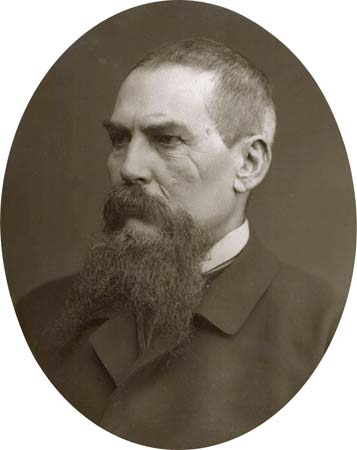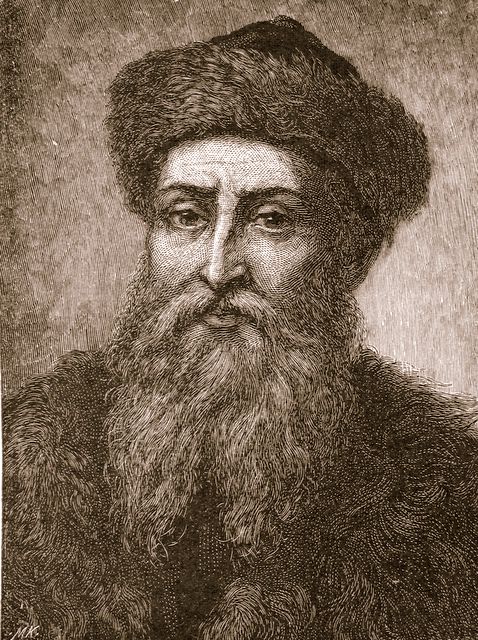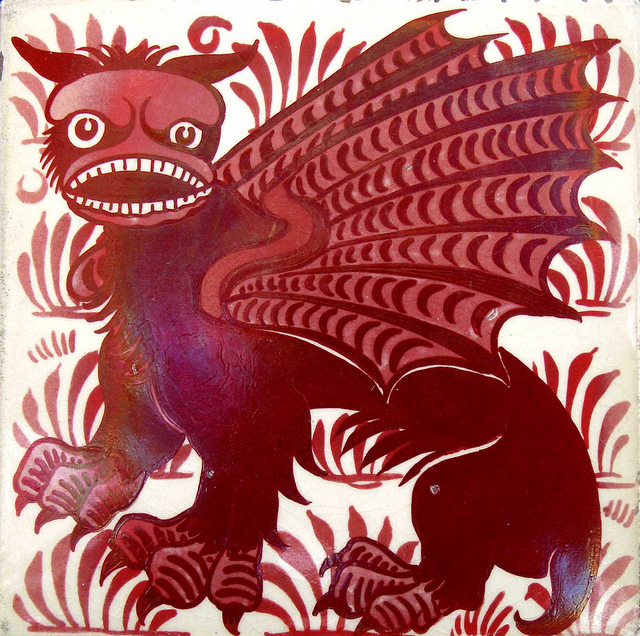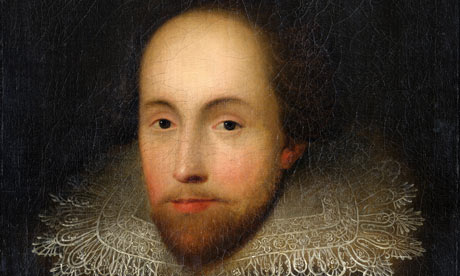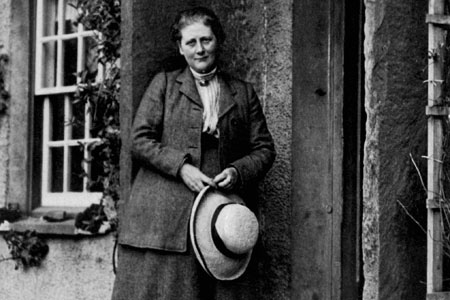Burton was a Victorian explorer, writer and translator, known for his travels in Asia and Africa.
Richard Francis Burton was born in Devon on 19 March 1821. His father was an army officer. Burton accompanied his parents on their frequent trips abroad and showed an early talent for languages.
Burton was thrown out of Oxford University in 1842 and joined the army of the East India Company where his knowledge of local languages helped his work in surveying and in intelligence. In 1853, taking leave from the company, he undertook a ‘Hajj’ or pilgrimage to Mecca, in disguise, and his account of this trip made him famous. The following year he explored what is now Somalia with a number of other officers, including John Speke.
In 1857, Burton and Speke embarked on a Royal Geographical Society funded expedition to explore inland from the east African coast, with the hope of finding the source of the Nile. It was a difficult trip. When they arrived at Lake Tanganyika, Speke was almost blind and Burton could hardly walk. Speke travelled on alone and discovered Lake Victoria, which he was convinced was the Nile’s source. Burton disagreed and this contributed to a long and bitter public quarrel between the two men which ended in September 1864 when Speke died in a shooting which was either suicide or an accident.
Burton now joined the Foreign Office, and was appointed consul in Fernando Po, an island off the coast of West Africa. His wife Isabel, who he had married in 1861, was unable to join him as the climate was considered too unhealthy. They were reunited when he was transferred to Brazil and then, in 1869, to Damascus. In 1871, he was moved to Trieste, where his position gave him plenty of time to write. He was knighted in 1886.
Burton was a prolific author, mainly on travel and ethnography. He also translated classical and Renaissance literature, with a particular interest in eastern erotica – he translated and printed the ‘Kama Sutra’ (1883) and ‘The Perfumed Garden’ (1886). He also published a complete edition of the ‘Arabian Nights’ (1885 – 1888).
Burton died in Trieste on 20 October 1890. He and Isabel are buried in a tomb in the shape of a Bedouin tent in Mortlake, southwest London.
Burton’s major works published in book form are available here in facsimile format. These are partly derived from books.google.com (in which case corrections and additions have usually been made to supplement imperfect reproductions) or the Internet Archive, or are original editions by burtoniana.org; they are provided here for scholarly non-commercial purposes only. For rare variant editions, see the auction catalogues. Burton also published numerous pamphlets, many of which are now rather hard (or impossible) to find.
Major Works by Richard Francis Burton.
- 1851. Goa, and the Blue Mountains; or Six Months of Sick Leave. London, Richard Bentley.
- 1851. Scinde; or, The Unhappy Valley. (2 volumes) London, Richard Bentley.
- 1851. Sindh, and the Races that Inhabit the Valley of the Indus. London, W. H. Allen.
- 1852. Falconry in the Valley of the Indus. London, John van Voorst.
- 1853. A Complete System of Bayonet Exercise. London, William Clowes.
- 1855-6. Personal Narrative of a Pilgrimage to El-Medinah and Meccah. (3 volumes) London, Longman.
- 1856. First Footsteps in East Africa; or, An exploration of Harar. London, Longman.
- 1860. The Lake Regions of Central Africa, A Picture of exploration. (2 volumes) London, Longman.
- 1861. The City of the Saints and Across the Rocky Mountains to California. London, Longman.
- 1863. (ed.) The Prairie Traveler, a Hand-book for Overland Expeditions by Randolph B. Marcy. London, Trübner.
- 1863. Abeokuta and the Camaroons Mountains. An Exploration. (2 volumes) London, Tinsley.
- 1863. Wanderings in West Africa, From Liverpool to Fernando Po. (Anon. by F.R.G.S.) (2 volumes) London, Tinsley.
- 1864. A Mission to Gelele, King of Dahome. (2 volumes) London, Tinsley.
- 1864. The Nile Basin. London, Tinsley.
- 1865. Wit and Wisdom from West Africa. London, Tinsley.
- 1865. The Guide-book. A Pictorial Pilgrimage to Mecca and Medina. London, William Clowes.
- 1865. Stone Talk. London, Robert Hardwicke.
- 1869. Explorations of The Highlands of Brazil. (2 volumes) London, Tinsley.
- 1870. Vikram and the Vampire, or Tales of Hindu Devilry. London, Longman.
- 1870. Letters from the Battlefields of Paraguay. London, Tinsley.
- 1871. Unexplored Syria (2 vols.) London, Tinsley.
- 1872. Zanzibar; City, Island, and Coast. (2 volumes) London, Tinsley.
- 1872. The Case of Captain Burton, Late H. B. M.’s Consul at Damascus. Clayton & Co, London.
- 1873. (transl.) The Lands of Cazembe. Lacerda’s Journey to Cazembe in 1798. London, John Murray.
- 1874. (ed.) The Captivity of Hans Stade of Hesse, in A.D. 1547-1555, Among the Wild Tribes of Eastern Brazil. London, Hakluyt Society.
- 1875. Ultima Thule; or A Summer in Iceland. (2 volumes) London, William P. Nimmo.
- 1876. Etruscan Bologna: A Study. London, Smith, Elder & Co.
- 1876. A New System of Sword Exercise for Infantry. London, William Clowes.
- 1876. Two Trips to Gorilla Land and the Cataracts of the Congo. (2 volumes) London, Sampson Low.
- 1877. Sind Revisited (2 volumes). London, Richard Bentley.
- 1878. The Gold-Mines of Midian and The Ruined Midianite Cities. London, C. Kegan Paul.
- 1879. The Land of Midian (revisited). (2 volumes) London, C. Kegan Paul.
- 1880. The Kasidah of Haji Abdu El-Yezdi a Lay of the Higher Law. London, Bernard Quaritch.
- 1880. (transl.) Os Lusiadas (The Lusiads). (2 volumes) (Ed. Isabel Burton.) London, Bernard Quaritch.
- 1880. Report on Two Expeditions To Midian; Report Upon the Minerals of Midian; Correspondence with his Excellency Riaz Pasha upon the Mines of Midian. Alexandria, Egypt, Alexandria Stationers’ & Booksellers’ Company.
- 1881. Camoens: His Life and His Lusiads. (2 volumes) London, Bernard Quaritch.
- 1881. A Glance at the “Passion-Play”. London, W. H. Harrison.
- 1883. To the Gold Coast for Gold. (2 volumes) London, Chatto & Windus.
- 1883. (transl.) The Kama Sutra of Vatsayana. London, Kama Shastra Society.
- 1884. (transl.) Camoens. The Lyricks. (2 volumes). London, Bernard Quaritch.
- 1884. The Book of the Sword. London, Chatto & Windus.
- 1885. (transl.) Ananga Ranga Cosmopoli, Kama Shastra Society.
- 1885. (transl.) A Plain and Literal Translation of the Arabian Nights’ Entertainments. (10 volumes) Benares, Kama-Shastra Society.
- 1886-8. (transl.) Supplemental Nights to the Book of The Thousand Nights and a Night. (6 volumes). Benares, Kama-Shastra Society
- 1886. (transl.) Iracema, The Honey-lips and Manuel de Mores. London, Bickers and Son.
- 1886. (transl.) The Perfumed Garden of the Cheikh Nefzaoui. London and Benares, Kama Shastra Society.
- 1887. (ed.) The Beharistan (Abode of Spring) London and Benares, Kama Shastra Society.
- 1888. (transl.) The Gulistan or Rose Garden of Sa’di. Benares, Kama Shastra Society.
- 1890. (transl.) Priapeia or the Sportive Epigrams of divers Poets on Priapus Cosmopoli.
- 1891. (ed.) Marocco and the Moors. by Arthur Leared. London, Sampson Low.
- 1893. (transl.) Il Pentamerone; or, the Tale of Tales. London, Henry and Co.
- 1894. (transl.) The Carmina of Gaius Valerius Catullus. London, Privately printed.
- 1898. The Jew The Gypsy, and El Islam. Ed. W. H. Wilkins. London, Hutchinson.
- 1901. Wanderings in Three Continents. Ed. W. H. Wilkins. London, Hutchinson.
- 1911. The Sentiment of the Sword: A Country-House Dialogue. London, Horace Cox.
- 1982. The Uruguay: A Historical Romance of South America. Berkeley, University of California Press.
- 1990. Sir Richard Burton’s Travels In Arabia And Africa: Four Lectures From A Huntington Library Manuscript. Edited by John Hayman. Huntington Library Press.
- 2003. (transl.) Pilpay’s Fables. Bangkok: Orchid Press, 2003.
Credit:
BBC
http://burtoniana.org/

